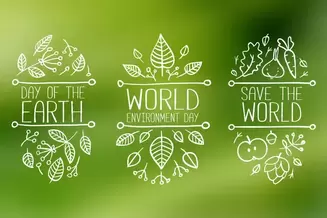What is Global Warming? Definition:
|
NOW IS TIME TO ACT ON A CD |
If you are thinking about opening a CD, short for certificate for deposit, it's time to act now to lock in the best rate possible.
CDs are one of the lowest-risk places to park your cash. Here's a rundown of some of the reasons why opening one can be a good fit for your financial goals:
Guaranteed return.
Rates on standard CDs are fixed. Unlike the stock market, which fluctuates, CDs offer a reliable return. This makes planning and budgeting easy since you will know exactly how much you will make and when you can withdraw the funds.
Better earning potential vs. other savings accounts.
CDs may pay more than other deposit accounts, such as savings and money market accounts.
Keeping spending in check.
CDs have early withdrawal penalties, which can act as a helpful way to reduce your temptation to spend. Because you won't want to forfeit your interest earnings, you will think twice before trying to withdraw the money.
No need to pick just one.
You can create a steady income stream for yourself by laddering CDs.
Safety.
CDs at federally insured banks and credit unions are protected.
Average CD rates steadily increased as the Fed hiked rates, and they have since leveled off. While the forecast for CD rates doesn't look quite as promising, the best CDs are still paying above 5% and outpacing inflation.
Before doing anything with your money, it's smart to look ahead to your future and determine your goals. As you think about what you want to be able to do with your money, it's equally important to be prepared for a disaster.
Make sure you have enough money in your emergency fund — typically at least three to six months of living expenses. Don't put that cash in a CD, either. It's better off in a high-yield savings account that will let you access the funds at a moment's notice, not an account that can have a pricey penalty if money is withdrawn early.
CDs typically require that you invest your money for a specific amount of time, called a term. During the term, you agree not to withdraw the money.
CD terms can range from as brief as a month to as long as five years. Some banks even offer 10-year CDs.
You also should shop around as with any investment product. The national average for a one-year CD is just 1.81% APY, according to the FDIC's most recent data.
Online banks often pay better rates because they do not have the overhead of maintaining branches that traditional brick-and-mortar banks have.
Financial institutions also differ on the size of the deposit required to open a CD. Some banks, such as Ally Bank and Synchrony Bank, do not have
deposit minimums.
Many banks, though, require you to put at least $500 or $1,000 in the account. Others require $5,000 or more.
As you shop around, make sure you are doing business at a federally insured bank or credit union. At one of those institutions, your money would be protected if it fails.
By strange coincidence, two once-in-a-generation events are about to take place in the natural world. These events are not to be missed, judging from the excited voices attending them.
The first is the total eclipse of the sun scheduled for Monday, although "scheduled" seems an inapt word to describe something whose timing was established before there were ... well, schedules. "Expected" might be a better choice, but that word suggests a degree of uncertainty that doesn't exist in orbital mechanics. "Ordained" connotes a divine mandate, as does "predestined." Put it this way: The eclipse will happen. The only question is how many North American earthlings will be able to see it. A cloudy day would ruin the experience. There will be no rain checks.
The track of totality runs hundreds of miles to our south, starting in Texas and ending up in Maine. Because this will be the last total eclipse visible in North America until 2044, people from Minnesota and other places are making plans to travel to see it. There is no way to guarantee the weather will cooperate, however. To drive such a distance, and maybe book a room in some quaint town with a fitting name — we notice that there is an Evening Shade, Ark., and what could be more perfect? — is to make a leap of faith. Good luck to the leapers.
Most of Minnesota will experiencebetween 60% and 80% of totality, which is still something to see. But don't look at it directly. To avoid damaging your eyesight, be sure to use eclipse glasses or a pinhole projector.
The other event involves less precision, in both timing and geography. Sometime this spring, two separate broods of periodical cicadas will emerge from the ground more or less in unison. One, known to scientists as Brood XIII, appears every 17 years. The other, Brood XIX, shows up every 13 years. Brood XIII is the more northern of the two, occupying territory in Illinois and parts of Iowa, Wisconsin and Indiana. Brood XIX is scattered more broadly along the Southeastern seaboard and deep South, with sightings that range into Illinois and Missouri.
And yes: Those areas overlap. Illinois, especially, is about to host a cicada convention on a massive scale. For a 13-year and a 17-year brood to emerge simultaneously, and in the same location, is an extremely rare event. And a noisy one.
Fortunately for all concerned, cicadas are harmless. The cousins we know here in Minnesota are the annual variety, known as dogday cicadas. They are here every year, and the buzzing sound they make with their abdominal membranes is a familiar soundtrack to our summer evenings.
Minnesota cicadas are active between July and September. Their emergence may not be as dramatic as that of the periodical cicadas, which have been underground for more than a decade, waiting for this moment. But Minnesota, after all, is not a dramatic place.
Our cicadas are a steady presence; they are good enough. We will get only a partial eclipse; also good enough. We have 10 electoral votes, compared to California's 54. U.S. News and World Report ranks Minnesota as the fifth best state overall, and CNBC says we're the fifth best state for businesses.
In most ways, we have room for improvement, but generally speaking, we do well enough. Could do worse.
But if you're not satisfied, and long for something to put us on the map, here is hope: We may be in for an outbreak of forest tent caterpillars, sometimes called army worms. That's just a nickname, and an inaccurate one at that, inspired by the caterpillars' habit of massing in fearsome hordes.
Most years, their presence in Minnesota is barely noticeable. But every 10 to 16 years, their numbers increase dramatically and stay that way for up to four years. They defoliate trees. They do not bite people, but they can take a lot of the fun out of picnics and create a slippery mess under the wheels of cars.
Minnesota's DNR says they should be busting out sometime between now and 2029. Should be spectacular.
Strike a balance to avoid regrets |
A primary job of financial planners is to help their clients see what is possible. It is also to help them balance living today while preparing them for tomorrow. But not knowing how many tomorrows we have can create too much emphasis on an uncertain future.
How do you strike a balance to avoid regret? The answer is simple but not easy: Be conscious of the choices you are making and for whom you are making them.
One of our long-term clients is now in hospice. As we were talking, she said how grateful she was for what she and her husband did with their family and how they were not too conservative too soon with their money.
The couple never fully lived in the comparison world, so their own personal values influenced their decisions.
They did not spend much money on housing, but they lived comfortably. They chose to invest in their children's education and travel, both things that brought them joy.
They often paid for their adult children to travel with them to underscore their value around family. Although cancer will rob her of some years, she has lived her life fully.
I have worked with countless clients, and here is some wisdom I have discovered that helped them avoid regret:
They don't begrudge others for what they have.
Being genuinely happy for the happiness of others reduces the focus on what you don't have and increases the satisfaction of your own life, a surefire antidote for regret.
They don't compare their lives to those of others.
You make the choices that are important to you, not because you are measuring yourself against someone else.
They say yes more often.
Sure, you end up making some mistakes, but you also open yourself up to more fulfilling experiences. Pleasant memories expand through time, and time tempers the sour ones.
As I look back on my life, something I won't regret is my simple morning walk with our dog.
Spend your life wisely.
Ross Levin is the founder of Accredited Investors Wealth Management in Edina. He can be reached at ross@ accredited.com.
Archives
April 2024
March 2024
February 2024
January 2024
December 2023
November 2023
October 2023
September 2023
August 2023
July 2023
June 2023
May 2023
April 2023
March 2023
February 2023
January 2023
December 2022
November 2022
October 2022
September 2022
August 2022
July 2022
June 2022
May 2022
April 2022
March 2022
February 2022
January 2022
December 2021
November 2021
October 2021
September 2021
August 2021
July 2021
June 2021
May 2021
April 2021
March 2021
February 2021
January 2021
December 2020
November 2020
October 2020
September 2020
August 2020
July 2020
June 2020
May 2020
April 2020
March 2020
February 2020
January 2020
December 2019
November 2019
October 2019
September 2019
August 2019
July 2019
June 2019
May 2019
April 2019
February 2019
January 2019
December 2018
November 2018
October 2018
September 2018
August 2018
July 2018
June 2018
May 2018
April 2018






 RSS Feed
RSS Feed